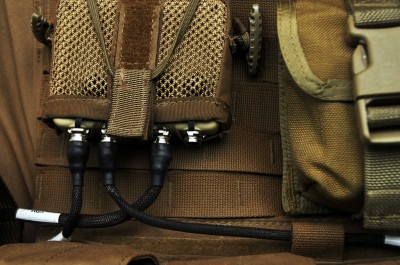

The Marine Austere Patrolling System's (MAPS) vest power manager (VPM-402) connects and manages multiple, tactical power requirements through a single interface. MAPS is a technology being developed at the Naval Surface Warfare Center Dahlgren Division for the Marine Expeditionary Energy Office. The system improves the sustainability of dismounted Marines on patrol by providing them with a central energy source, a wearable solar panel and a water filtration system. (U.S. Navy photo by Elliott Fabrizio/Released)
DAHLGREN, Va.—Marines are testing prototypes of the new Marine Austere Patrolling System (MAPS) at an End User Evaluation from July 17-24 in Camp Pendleton, Calif.
The Naval Surface Warfare Center Dahlgren Division (NSWCDD) developed MAPS as an individual, wearable power management and distribution system, enabling Marines to patrol longer without resupply.
"One of the goals of MAPS is to provide greater field sustainability to Marines," said Marine Maj. Anthony McNair, Marine Liaison and MAPS Program Sponsor at the Marine Expeditionary Energy Office.
The system features an advanced solar panel and a water filtration system.
"There are a lot of metrics that illustrate the correlation between transport missions and combat casualties," said McNair. "If we can decrease the number of fuel and water resupplies Marines need, that's fewer people we have to expose to that danger and less casualties."
The system integrates flat-form batteries and provides a central source of electrical energy that can be adapted to any equipment's electrical requirements.
Common electronics the vest can power for Marines include gear such as radios, night-vision goggles, global positioning system (GPS), laptops and Universal Serial Bus (USB) powered equipment.
"Dismounted Soldiers and Marines typically carry between 15 to 20 pounds of unique batteries," said Eric South, NSWCDD lead electrical engineer for MAPS. "In some cases, they may have a dead radio, but a fully charged GPS. The MAPS system will enable Marines to power the dead radio from the GPS."
The vest power manager (VPM-402) provides Marines with a universal interface to multiple energy requirements.
"VPM is the electrical heart of the system," said South. "You can plug in nearly any energy source between 4 and 34 [volts direct current] and any energy load commonly worn or carried by dismounted combatants. Whatever you want to take power from or put power into, the power manager automatically recognized what's plugged in and sets itself to do the electrical conversations."
The central power source, an ergonomically fitting battery, fits into currently fielded tactical vests. The wearable power system and energy harvesting capabilities of MAPS provides potential to reduce the weight of carrying multiple spares of standard batteries by up to 10 pounds for a multiple-day mission.
The vest further enhances the energy capabilities of Marines by adding an advanced, wearable solar panel developed by the Naval Research Laboratory (NRL).
"In multi-junction (MJ) solar cells, each junction is 'tuned' to different wavelength bands in the solar spectrum to increase efficiency," according to a NRL press release.
While NRL is developing the multi-junction solar panel to break the 50-percent solar energy conversion efficiency barrier-the current record being 44 percent efficiency-the triple-junction panel used in MAPS provides 30 percent efficiency. This is approximately a 22 percent improvement over other solar panels in military use.
In addition to solar energy, MAPS can accept power from civilian and military vehicles and various commonly used batteries.
MAPS also features a water filtration system that provides Marines with safe drinking water from any water source found in the field.
MAPS is being developing for the Marine Expeditionary Energy Office and directly supports the USMC Expeditionary Energy Strategy and Implementation Plan to, "deploy Marine Expeditionary Forces that can maneuver from the sea and sustain C4I (command, control, computers and intelligence) and life support systems in place."
"By 2025," added McNair, "the commandant wants zero fuel to be used in the battlefield except for mobility."
The End User Evaluation takes MAPS out of the lab and puts it on the backs of Marines to prepare for the trials of real-world use.
NSWC engineers are collecting performance data in addition to comfort and usability feedback from Marines integrating MAPS into their standard pre-deployment exercises.
"This type of prototype-level testing is designed to glean user feedback, so when we go into formal testing, it will be with a system that has already been used by Marines and has received their feedback," said South. "We rely heavily on our interactions with the fleet Marine Corps to improve our system."
MAPS will undergo a second series of informal testing with Marines in Bridgeport, Calif., this fall.


